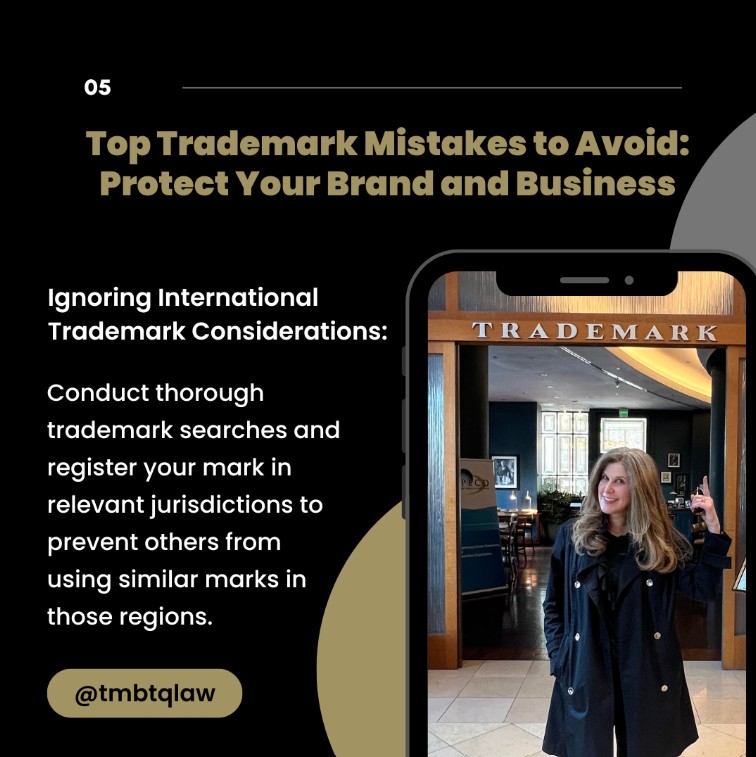Do I Need to Trademark My Business?
This is a question we hear over and over again. Whether your business is established, having been around for decades, or you run your startup idea from your closet on the weekends, you should have a plan of action for protecting your company’s intellectual property assets, including the company or brand name and logo. It’s never too early or too late to start the trademark process, and having officially registered marks sets your business up to take a strong position in its market.
Not convinced yet? That’s okay. In this blog post we’re going to go through EVERYTHING you need to know so you can decide what direction you want to go in with your company’s trademarks. Here’s what you’re going to learn:
- What IS a trademark?
- Who DOES NOT need to register their trademark?
- The benefits of registering your trademark, both legal and financial
We’ve got a lot to cover in today’s blog, so let’s get right to it! A trademark is anything that identifies your services or products, to break it down to the most basic definition – anything that differentiates you from your competitors, and helps customers recognize you. Generally, these identifiers are either words, phrases, symbols, or designs, or sometimes a combination of all or some of these assets used in connection with particular goods or services. However, the definition of “trademark” means that almost anything is a possibility: sounds, smells, tastes, and even colors can all be trademarked. For most purposes, a more traditional mix of text and graphics meet the business’s needs, so don’t worry too much about creating the right sound or smell to communicate to your audience.
MOST trademarks companies will be considering filing will either be standard character or special form (design) marks. Standard Character marks, aka word marks, are words, letters, or numbers only, or sometimes a combination. They can be used in any font and there is no specific stylization. For example, phrases like “It’s Finger-lickin’ Good!” “Just Do It” “America Runs on Duncan’s” and brand names like “Coca-Cola” “Twitter” “Lululemon” are all great examples of standard character trademarks. Standard marks are protecting the words, regardless of how they are displayed.
Design marks/ special form trademarks include marks that are stylized, are in a specific color, or have some other type of design element. What we think of as logos are a large part of special form marks, but they can also refer to marks that consist of text in a specific font, or otherwise visually stylized in some manner.
Iconic special form trademarks


Hopefully you now have a better understanding of the definition of trademarks, including special form and standard form marks. With that knowledge under our belts, we’re moving onto helping you make the choice: to register a trademark? Or not?
Who DOESN’T Need to Register their TM?
This article is meant to help readers decide whether or not to go through the trademark process . Realistically, not everyone needs to. There are a very limited number of scenarios in which it’s simply not necessary to register your trademark, which we are going to run through below:
- The rights you need are very limited in scope and you don’t anticipate expansion in the future. You actually gain rights to a trademark the moment you begin to use said trademark in a manner that associates it with your goods and/or services, according to the US government. This does afford you the rights that are associated with holding a mark, but in a limited capacity: these rights only apply to the geographic area in which you’re providing your goods/services. There are a few situations in which the business owner is certain that they will not be growing into geographic regions outside of their immediate surroundings. Of course, most companies are going to want the peace of mind that comes with a registration.
- You are not using or ever planning to use the ® symbol in conjunction with your trademark, and are satisfied continuing to use the ™ symbol instead. In reality, these two symbols are very similar and it’s unlikely that using one or the other would create a problem, but it’s worth mentioning just in case. If you plan to just never move forward with the Trademark process, you will never be allowed to utilize the ® symbol and can face repercussions if you choose to. Even if you feel like no one will notice, swapping your ™ for the more professional-looking ® is the wrong choice unless you do indeed have a Federally registered trademark.
There are not many exceptions, but if your business fits into either one or both of these scenarios and you don’t have any other reasons to pursue a legal trademark then, well, your work here is done! For everyone else, let’s get to the good stuff: the awesome BENEFITS that come along with having a legally registered trademark!
Legal Benefits of Registering Your Trademark
The most reassuring part of having legal rights to a trademark is probably the legal upper hand that you now have thanks to your decision to legally file your mark. Let’s go through all of the best legal perks that come along with the territory:
- If someone is using a trademark that is similar to yours, registering your trademark gives you the right to bring a lawsuit concerning said trademark in federal court. Because trademarks registered with the U.S. Patent and Trademark Office presumptively cover the entire United States, this means that you can sue others who are using your trademark or a too similar trademark not only in your immediate geographic area, but anywhere in the country.
- Your diligence at this stage in your business development means that you’ll have the legal peace of mind that comes with knowing for certain that you can conduct business under your entity name. Your company name that you perhaps spent so many hours agonizing over is shielded and protected, at least to a much greater degree than if you moved forward without a trademark registration.
- The trademark(s) associated with your business is/are listed in the USPTO database of registered and pending trademarks. This provides public notice to anyone searching for similar trademarks, thus protecting you from the headache of going through the opposite of the last situation. Your trademark, the goods or services subject of your registration, the owner, application date, and other details will be publicly available.
- Where your mark is concerned at least, your business will have legal presumption that you own the trademark and have the right to use it. So, in federal court, your registration certificate proves ownership, eliminating the need for vast amounts of evidence. Basically, registering a trademark means that you have fully satisfied the legal requirements for proving that a mark inarguably belongs to you.
- If you are in a growing business sector or have plans for continuing expansion, you can use your registration as a basis for filing for trademark protection in foreign countries.
- Like we just mentioned, you may use the federal trademark registration symbol, ®, with your trademark to show that you are registered with us. Besides making you look legitimate as a business, using this also may help deter others from using your trademark or one too similar to yours.
Financial Benefits of Registering Your Trademark
The legal arguments for trademark registration are pretty obvious – most professionals have some concept of trademark infringement and the potential headaches that can come along with not crossing your t’s and dotting your i’s. The legal protection is great, but arguably even more rewarding are the variety of unexpected financial benefits that businesses can experience when they choose to go through the process of trademark registration.
- You protect any income in the name of your business as your own. Small and large-scale businesses alike need to always be wary of imitators or counterfeiters – now more than ever. The more success you experience, the more problems you’ll likely face with others trying to benefit from the positive brand you’ve worked for. These imitators can potentially start to affect your profits, not to mention degrade your reputation – you can’t control the quality of goods/services they are providing while using your trademarks. Fortunately, registration gives you the means to put a stop to unauthorized use and a path to recover any losses your business suffered.
- You protect yourself financially. We’ve definitely touched on this topic already, but it bears repeating: a properly cleared and registered trademark means that it is unlikely you will ever pay any damages to another company for unwitting infringement. You also are potentially entitled to damages if you find yourself in the reverse situation. A strong, well-protected, and easily identifiable brand makes certain that your customers won’t fall prey to spending money with a competitor imitating your trademarks – money that could have gone to you.
- Most importantly, you are protecting your reputation for quality as a company. It’s not easy to build a strong brand, but the potential value is worth the effort. Registering your trademark is like a suit of armor around the brand you have worked hard to bring to life. Not only can you legally make sure anyone attempting to file with your mark is not allowed to do so, you can challenge applications in court that may not be an exact match, but are close enough to cause confusion amongst your customer base.
So, What’s the Takeaway?
We just hit you with a lot of information about trademark registration, but all of it can ensure that you take whatever steps are best for your business and individual circumstances. There are an overwhelming amount of reasons why you SHOULD register trademarks, but as you now know it’s not necessarily the right fit for every single case.
Our hope is that by providing this comprehensive dive into trademarks – their definition, examples of different mark types, reasons for not registering, and finally the benefits both financial and legal that come along with registering marks – you are better informed and equipped to make the choices that will grow your business!
If you aren’t already following us on social media, we post high-value, useful information for business owners on our Instagram (@tamarapesterlaw) every single day! Don’t forget to share this blog post if you got something out of it.
Thanks for reading, see you soon!
Volkswagen Photo by Andrea De Santis on Unsplash and Starbucks Photo by Henry & Co. on Unsplash



